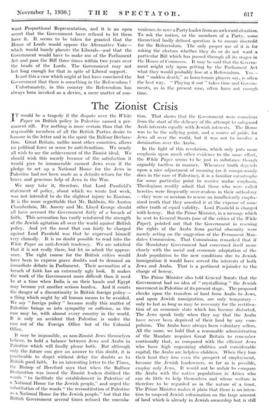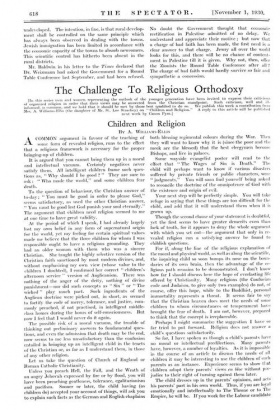The Ziot list Crisis
TT would be a tragedy if the dispute over the While Paper on British policy in Palestine caused a per- manent rift. For nothing is more certain than that the responsible members of all the British Parties desire to honour in the letter and in the spirit the Balfour Declara- tion. Great Britain, unlike most other countries, allows no political force or sense to anti-Semitism. We nearly all wish to see the achievement of the Zionist ideal. We should wish this merely because of the satisfaction it would give to innumerable earnest Jews even if the pledge to set up a National Home for the Jews in Palestine had not been made as a definite return for the brave and generous help of Jews in the War.
We may take it, therefore, that Lord Passfield's statement of policy, about which we wrote last week, was not intended to do the slightest injury to Zionism. It is the more regrettable that Mr. Baldwin, Sir Austen Chamberlain, Mr. Amery and Mr. Lloyd George should all have accused the Government flatly of a breach of faith. This accusation has vastly reinforced the strength of the Jewish agitation all over the world against British policy. And yet the most that can fairly be charged against Lord Passfield was that he expressed himself very clumsily. It is no doubt possible to read into the White Paper an anti-Jewish tendency. We are satisfied that it is not really there, but let us admit the appear- ance. The right course for the British critics would have been to express grave doubts and to demand an immediate debate in Parliament. Their accusation of a breach of faith has an extremely ugly look. It makes the work of the Government more difficult than it need be at a time when India is on their hands and Egypt may become yet another serious burden. And it courts the danger of a discontinuity in British foreign policy— a thing which ought by all human means to be avoided. We say " foreign policy " because really this matter of Palestine brings us into sympathy or collision, as the case may be, with almost every country in the world. It is only an accident that Palestine is under the care not of the Foreign Office but of the Colonial Office.
It may be impossible, as non-Zionist Jews themselves believe, to hold a balance between Jews and Arabs in Palestine which will finally please both. But although only the future can give an answer to this doubt, it is practicable to dispel without delay the doubts as to British good faith. In an interesting letter to the Times, the Bishop of Hereford says that when the Balfour Declaration was issued the Zionist leaders disliked the Words " to facilitate the establishment in Palestine of a National Home for the Jewish people," and urged the substitution of the words " the reconstitution of Palestine as a National Home for the Jewish people," but that the British Government several times refused the emenda-
tion. That shows that the Government were conscious from the start of the delicacy of the attempt to safeguanl Arab interests equally with Jewish interests. The Home was to be the rallying point, and is source of pride, for Jews all over the world, but it was not to involve a domination over the Arabs.
In the light of this revelation, which only puts inure emphasis upon much other evidence to the same effect, the White Paper seems to be just in substance though arguably tactless in manner. Whenever truth depends upon a nice adjustment of meaning (as it conspicuously does in the case of Palestine), it is a familiar eatast rophe for some particular point to receive undue emphasis. Theologians readily admit that those who were called heretics were frequently over-zealous in their orthodoxy —they were so anxious to rescue an insufficient ly empha- sized truth that they asserted it at the expense of sonic other truth of equal validity. Lord Passlield is charged with heresy. But the Prime Minister, in a message which he sent to General Smuts (one of the critics of the While Paper), pointed out that the Government in reselling the rights of the Arabs from partial obscurity were merely acting on the suggestion of the Permanent Man- dates Commission. That Commission remarked that if the Mandatory Government had concerned itself more closely with the social and economic adaptation of the Arab population to the new conditions due to Jewish immigration it would have served the interests of both Jews and Arabs. That is a pertinent rejoinder to the charge of heresy.
The Prime Minister also told General Smuts that the Government had no idea of " crystallizing " the Jewish movement in Palestine at its present stage. The proposed checks upon the transfers of land from Arabs to Jews, and upon Jewish immigration, are only temporary— only to last as long as may be necessary for the rectifica- tion of an economic state which has become distorted. The Jews speak truly when they say that the Arabs have never been deprived of their land by any com- pulsion. The Arabs have always been voluntary sellers. All the same, we hold that a reasonable administration of the Mandate requires Great Britain to remember continually that, as compared with the efficient Jews who have high organizing abilities and considerable capital, the Arabs are helpless children. When they lose their land they lose even the prospect of employment, because the Jewish landowners, so far as is possible, employ only Jews. It would not be unfair to compare the Arabs with the native populations in Africa who can do little to help themselves and whose welfare is therefore to be regarded as in the nature of a trust. The Prime Minister makes it plain that there is no inten- tion to suspend Jewish colonization on the large amount of land which is already in Jewish ownership but is still
undeveloped. The intention, in fine, is that rural develop- ment shall be controlled on the same principle which has always been observed in dealing with the towns. Jewish immigration has been limited in accordance with the economic capacity of the towns to absorb newcomers. This scientific control has hitherto been absent in the rural districts.
Mr. Baldwin in his letter to the Times declared that Dr. Weizmann had asked the Government for a Round Table Conference last September, and had been refused.
No doubt the Government thought that economic rectification in Palestine admitted of no delay. We understand and •appreciate their motive ; but now that a charge of bad faith has been made, the first need is a clear answer to that charge. Jewry all over the world looks for this, and there will be no chance of content- ment in Palestine till it is given. Why not, then, offer the Zionists the Round Table Conference after all ? The charge of bad faith would hardly survive so fair and sympathetic a concession.











































 Previous page
Previous page